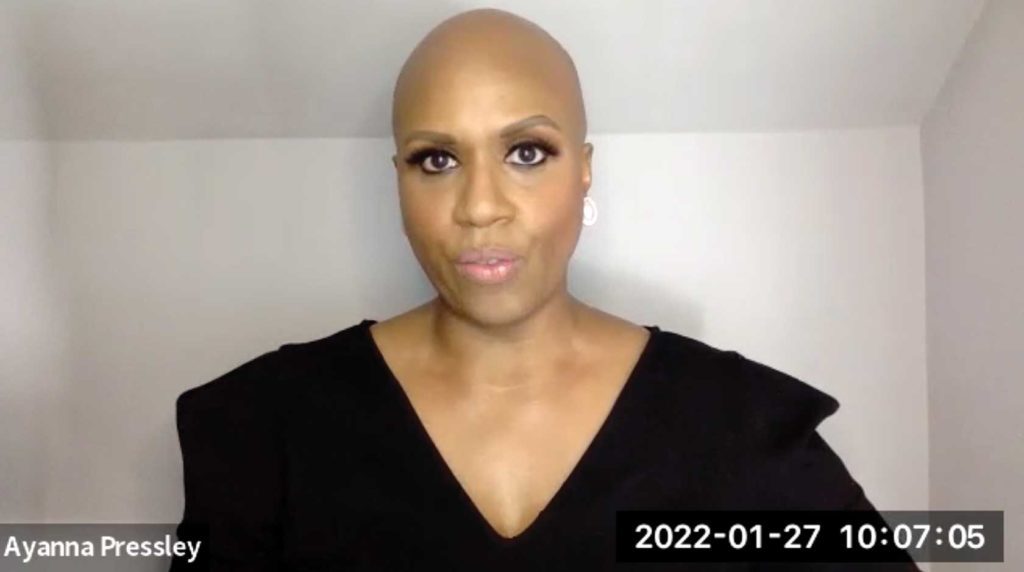Pressley, legislators call for state bank
Bank would specialize in small business lending to minorities

With Massachusetts residents continuing to struggle in the wake of the COVID-19 pandemic, advocates and lawmakers have taken the opportunity to promote an out-of-the-box solution — putting banking power, primarily lending capabilities, in the hands of the state.
In a virtual press conference last Thursday, Congresswoman Ayanna Pressley joined state Sen. Jamie Eldridge and state Reps. Nika Elugardo and Mike Connolly in support of their legislation aimed at establishing a Massachusetts public bank. The meeting, also attended by economists and local financial equity groups, aimed to put pressure on lawmakers set to adjourn their current session this week.
According to Pressley, the legislation is important for the economic recovery of those already being disadvantaged by private banking.
“For decades, profit-motivated decisions have driven bank branches to disappear from low-income communities, creating banking deserts, deserts that are dominated by predatory lenders,” the congresswoman said at the Jan. 27 press conference. “With public banking, we have a unique opportunity to provide financial stability for our communities while also addressing the economic inequalities and structural racism prolonged by the predatory lending practices and credit decisions made by Wall Street.”
If the bill is enacted, Massachusetts would be the second state to have a public bank –– the Bank of North Dakota was founded in 1919 and currently uses funds collected through taxes and fees to distribute agriculture, business, residential, infrastructure and student loans to state citizens.
The Massachusetts bank, as written in the proposed legislation, would support businesses and local municipalities, expand affordable housing access, contribute to enterprises owned by women and people of color and promote in-state spending through a $50 million pot set aside by state government every four years.
The authors of the joint bill also reassured those in attendance that the bank, like that of North Dakota, would explicitly work in conjunction with existing community-driven financial institutions to best serve residents.
“This would not compete with the existing commercial banking sector,” said Connolly. “Rather, what our bank seeks to do is leverage state resources to provide opportunities to individual organizations that can’t access financing.”
Elugardo said during her testimony, “We believe that it’s going to be very powerful tool and asset for the banks as well … particularly community-oriented banks. They take their CRA [Community Reinvestment Act] obligations very seriously.”
She added, “This public bank will make sure that the resources are available not only to the community, but also to financial institutions, for partnerships and to make sure that they can provide the services to the community members that they are trying to integrate into the broader economy and financial systems of Massachusetts.”
To ensure true community commitment, the bill also calls for a member of a community development finance institution to serve on the new bank’s board of directors. This piece was highlighted as particularly important by supporting organizations, including the Boston Ujima Project, which has been a vocal advocate for a public bank in the Bay State.
“We believe that communities are able to make decisions that impact them,” said Ujima Project Executive Director Nia Evans. “We believe that communities have the expertise to understand what their problems are and what the appropriate solutions are.”
Nicole Obi, president and CEO of the Black Economic Council of Massachusetts (BECMA), also classified the legislation as a critical move to promote equity across the state.
“We see this public banking legislation as an important opportunity towards closing the Massachusetts wealth gap, especially for our Black and other underrepresented entrepreneurs,” Obi said.
The bill, which was heard by the Joint Committee on Financial Services back in October, faces a deadline Wednesday to be approved and passed on to the Ways and Means Committee next session. However, opposition from the Massachusetts Bankers Association and research from the Federal Reserve Bank of Boston nearly a decade ago that advises against the creation of such a bank could create an uphill battle for the measure.
That did not deflate the bill’s supporters, who are hopeful other lawmakers can be swayed in their favor.
“As we rebuild and recover from the COVID-19 pandemic, we must fight for a financial system that provides a just and resilient economic future,” Pressley said Thursday. “Public banking is an affordable, accountable, equitable solution, and we must pass this bill.”






